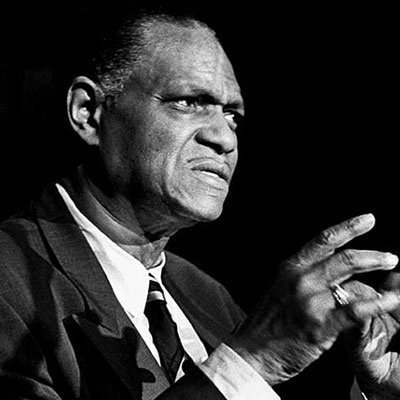McCoy Tyner

Inducted: 1995
It is to McCoy Tyner’s great credit that his career after John Coltrane has been far from anti-climatic. Along with Bill Evans, Tyner has been the most influential pianist in jazz of the past 50 years, with his chord voicings being adopted and utilized by virtually every younger pianist. A powerful virtuoso and a true original (compare his playing in the early ’60s with anyone else from the time), Tyner (like Thelonious Monk) has not altered his style all that much from his early days but he has continued to grow and become even stronger.
McCoy Tyner grew up in Philadelphia where Bud Powell and Richie Powell were neighbors. As a teenager he gigged locally and met John Coltrane. He made his recording debut with the Art Farmer-Benny Golson Jazztet, but after six months left the group to join Coltrane in what (with bassist Jimmy Garrison and drummer Elvin Jones) would become the classic quartet. Few other pianists of the period had both the power and the complementary open-minded style to inspire Coltrane, but Tyner was never overshadowed by the innovative saxophonist. During the Coltrane years (1960-1965), the pianist also led his own record dates for Impulse.
After leaving Coltrane, McCoy Tyner struggled for a period, working as a sideman (with Ike and Tina Turner, amazingly) and leading his own small groups; his recordings were consistently stimulating even during the lean years. After he signed with Milestone in 1972, Tyner began to finally be recognized as one of the greats, and he has never been short of work since. Although there have been occasional departures (such as a 1978 all-star quartet tour with Sonny Rollins and duo recordings with Stephane Grappelli), Tyner has mostly played with his own groups since the ’70s, which have ranged from a quartet with Azar Lawrence and a big band to his trio.
Tyner went on to tour and record with his own quartets and quintets, recording more than twenty-five albums and receiving two Grammy Award nominations. In 1984, he formed the McCoy Tyner Big Band for which he composes, arranges and performs. In 1988 he won a GRAMMY for his work on Blues for Coltrane, a tribute album to John Coltrane. He also won in 1992 and 1994 with McCoy Tyner Big Band, and again in 1995 for the large jazz ensemble category for the album, Journey. That year he also won with the McCoy Tyner Trio for the album Infinity.
Scott Yanow, All Music Guide (allmusic.com)